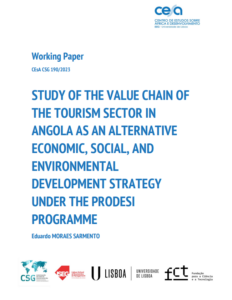Working Paper CEsA 190/2023 studies the tourism value chain as a strategy to promote economic, social and environmental development in Angola

CEsA has published its third Working Paper of 2023: “Study of the Value Chain of the Tourism Sector in Angola as an Alternative Economic, Social, and Environmental Development Strategy Under the PRODESI Programme” (n. 190/2023), in English, authored by CEsA researcher Eduardo Sarmento.
Click here to download Working Paper n. 190/2023: https://www.repository.utl.pt/handle/10400.5/27342
Read the summary below:
Angola has been facing several economic and social problems, with one of the most important being related to the country’s long tradition of dependency on oil as a major external revenue. Due to this situation, the country’s income has been slowing and there is a need to find alternative strategies to increase the liquidity of the economy without which Angola would lack the necessary funds to increase investment and proceed with adequate policies to combat social exclusion and eradicate the flows of poverty. Aware of this situation, the government implemented the national PRODESI project, whose aim is to accelerate the process of the diversification of the nation’s economy. To this end, the project aims to promote production and exports in the non-oil sectors, as well as in sectors with a strong potential for import substitution. One of these areas is tourism, as a means of developing some of the country’s regions and provinces, and also in order to benefit populations living in worse conditions, whilst diversifying the economic restrictions. The focus of actions in PRODESI foresees that the to accelerate the diversification of the economy, whether through import substitution or through diversification and an increase in exports, will be directed towards the production of goods and services or the implementation of new strategies designed to gain critical mass and create intraand intersectoral relationships, such as in the case of tourism. Accordingly, the purpose of this research is to identify the main weaknesses of the core value chain of tourism and to propose a set of measures and recommendations to be implemented within the scope of PRODESI. The main objective is to ensure that this activity effectively contributes to diversifying Angola’s economy in a sustainable path and that it helps leverage the increase in national production in a faster and more efficient way and thus significantly help decrease the dependency on imports and increase the export basis, which can be achieved through adopting a strategy of diversification, based on both international and national tourism. Methodologically, several studies were consulted and various meetings and in-depth field visits were made, between January and March 2000, in the provinces of Luanda, Malange, Huíla, and Namibe. Several interviews were carried out up until 2021with major players (ranging from ministers through to national directors and other experts) and tourist organizations (Ministries, Travel Agencies, and entrepreneurs). It is estimated that in the next 10 years Sub-Saharan Africa will register a growth in tourism superior to the global average, regardless of the COVID pandemic. This research concluded that even though tourism in Angola still faces a deficit at several levels, the country nevertheless has a set of natural resources and tourism attributes that, if properly explored and used, could provide an alternative way for the future development of Angola’s society. Angola still faces residual tourism receipts from tourism activity as well as in total international incoming tourists, and therefore Angola’s national government may have a huge opportunity to implement a suitable tourism strategy (both for internal and external flows), in order to not only reinforce its importance but also to benefit the population, fight poverty, and diversify economic activities, as defined in the PRODESI strategy.





